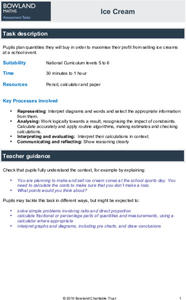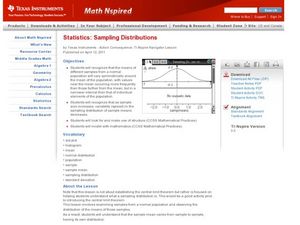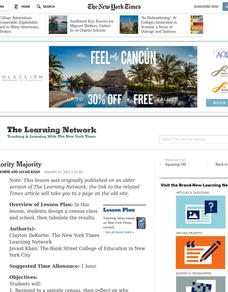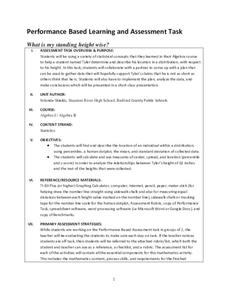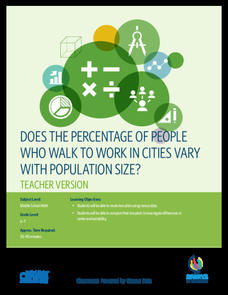NOAA
Invertebrates
Crabs and lobsters ... yum! The 18th installment of a 23-part NOAA Enrichment in Marine sciences and Oceanography (NEMO) program focuses on invertebrate marine life. After the lecture slideshow, learners conduct an activity to sample...
American Statistical Association
How Long Are the Words in the Gettysburg Address?
It's 268 words, but one only needs to consider 10 of them at a time. A data collection and analysis activity has learners investigate the lengths of words in the Gettysburg Address. They first self-select a sample of 10 words and...
K20 LEARN
If Our Classroom Were The World: Proportions And Percents
It's a small world after all. Classmates consider world population, languages, and religions in a cross-curricular instructional activity. Applying percentages and proportions, they determine what the class make-up would be if the class...
College Board
2000 AP® Environmental Science Free-Response Questions
Practice makes perfect! A released AP® exam gives scholars practice with the high level of expectations of their exams. The exam consists of four questions from 2000. Questions ask about endangered species, recycling, alternative fuels,...
US Department of Commerce
Over the Hill - Aging on a Normal Curve
Nobody is too old to learn something new. Young statisticians analyze census data on the percentage of the population older than 65 years old in US counties. They fit a normal distribution to the data, determine the mean and standard...
College Board
2018 AP® Statistics Free-Response Questions
Are your classes ready for their final exams? Give them a test run with the 2018 AP® exam. The resource provides the six free-response questions covering topics such as confidence intervals, population proportions, and least-squares...
Bowland
Ice Cream
Make sure there is enough ice cream on hand. Learners try to find out how much ice cream to buy for a sports event. Scholars use a pie chart showing the percent of a sample of people who like different flavors of ice cream. Using the...
National Security Agency
Sampling for a Rock Concert
Over the course of three class periods, middle schoolers design an experiment to provide learner input to administration about which rock band to invite to play at school. They practice several random sampling exercises, all well...
Curated OER
Confidence Intervals: Population Mean; Population standard Deviation Known
In this confidence interval worksheet, students examine a given confidence level and sample data to determine the margin of error, identify a confidence interval, list the mean and give the standard deviation. Students complete seven...
Curated OER
Confidence Intervals: Population Mean; Population Standard Deviation Unknown
In this confidence interval worksheet, students examine given statistical information to find the margin of error. They construct a confidence interval for the population and find the mean. Seven statistical problems are available on...
Curated OER
Confidence Intervals: Population Proportions
In this interval worksheet, young scholars examine given data to construct a confidence interval for a specified proportion. They also identify the minimum sample size needed to support the required margin of error around the population....
Illustrative Mathematics
Robot Races
Analyze data on a graph to answer three questions after a robot race. Learners practice comparing ratios and reading points on a graph. Answers may vary on the last question based on accuracy of graphing. Use the lesson along with three...
Curated OER
Sampling Distributions
Students analyze sampling from different population. In this statistics lesson, students define the meaning of sample sizes and what causes an increase or decrease. They graph their data on the Ti calculator and draw conclusion from the...
Curated OER
Parts Per Hundred (ppH)
In this parts per hundred worksheet, students read about describing components of a population by parts per a given number such as 100, 100 or 1 million. Students are given 6 problems to calculate the parts per hundred for each sample...
Curated OER
The Minority Majority
Students design a census class and school, then tabulate the results. They respond to a sample census, then reflect on why questions of race and national origin are different.
Curated OER
Research Methods in Psychology
This 5-question psychology review provided by Sparknotes addresses sampling bias, correlative data, statistical significance, and more.
Radford University
What is My Standing Height Wise?
Given a scenario in which a class member wants to prove his height is not an outlier, pairs devise a plan and gather evidence to help support his claim. The small groups implement their plans and create graphical displays of their data...
US Department of Commerce
Does the Percentage of People Who Walk to Work in Cities Vary with Population Size?
To walk or not to walk? Pupils create box plots comparing the percentage of residents who walk to work in large, medium, and small cities. Using the box plots, class members compare the data that reflects available statistics. Scholars...
Curated OER
Estimating the Mean State Area
Seventh grade statisticians randomly select five states and then determine the mean area. The class then works together to create a dot plot of their results.
Virginia Department of Education
Freshwater Food Chains
What's in the water? Encourage your class to further explore this question and learn about pond ecosystems, food chains, and food webs as they complete this hands-on activity. They view the environment from a new perspective after...
Howard Hughes Medical Institute
CSI Wildlife
Can DNA fingerprinting prevent the extinction of elephants? Young scientists learn about DNA fingerprinting before applying their knowledge to case studies of elephant poaching. The first case requires them to match the DNA from a tusk...
Curated OER
Sampling Techniques
Sixth graders examine how to select samples and apply them to an experiment. In this sampling lesson, 6th graders use a bag of yellow and blue cubes to take a sample. They predict how many of each color there are the bag. They set up and...
Curated OER
Population Study and Applications Using PTC Paper
Students study human population traits. In this science lesson plan, students gain an understanding of the terms dominant, recessive, haploid (monoploid), diploid, genotype, phenotype, scientific sampling, and scientific modeling as they...
Curated OER
Surveys and Samples
In this surveys and samples worksheet, students discover data collection techniques and write their own survey questions. Students use random sampling, convenience sampling, and systemic sampling and analyze their results.
Other popular searches
- Random Sampling Population
- Population Sampling Quadrat
- Sampling Animal Population
- Population Sampling Qua Drat
- Population Sampling Quiz
- Sampling Population
- Bat Population Sampling
- Natural Population Sampling
- Population Sampling Marine
- Science Sampling Population








